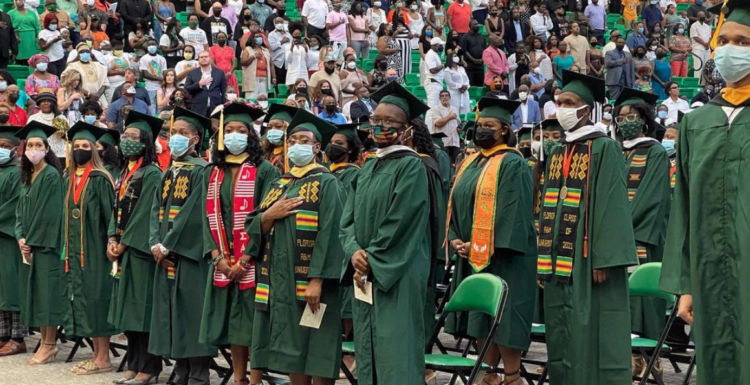According to the “Best Colleges 2022” guidebook by U.S. News & World Report, Florida A&M University (FAMU) has been ranked among the highest public universities in the nation.
FAMU has become the highest-ranked public HBCU at coming in seventh place among the publication’s public or private ranking of the “Top 10 Historically Black Colleges and Universities.”
The HBCU has now moved up 13 slots, from 117 to 104, among the top public universities in the U.S.
According to the Tallahassee Democrat, FAMU President Larry Robinson said in a release, “Moving up 13 places is a testament to our focus on student success and the dedication of our faculty, staff, and students to the tenets of our strategic plan, FAMU Rising.”
“Our intentionality and teamwork allow us to focus acutely on opportunities and more effectively address challenges,” he added.
“I am especially excited by our rise in the Social Mobility Index ranking because it reflects our 133-year commitment to transforming the lives of students regardless of their socioeconomic status or whether they are among the first in their family to attend college or are from a long line of Rattlers,” Robinson said.
“At FAMU, our faculty and staff recognize the promise in every student and understand society’s need for the contributions of our graduates,” he added.
Related Story: FAMU Taps Nike And LeBron James In Six-Year Athletic Apparel And Equipment Deal
Last year, FAMU was tied for seventh place in the “Top 10 HBCU” category with North Carolina A&T University.
FAMU Board of Trustees Chairman Kelvin Lawson said, “The rise in our rankings illustrates what we can do with a focused plan and improved investment, both of which are critical to our success. It is a statement about a joint effort between our Board and the President to establish and stick with key priorities.”
“We want to continue to push the envelope and focus on ongoing improvement in our operating model as we continue our march to the top 100 colleges and universities in the nation,” Lawson added.
The university currently has a five-year plan from 2017 until 2022, highlighting improving retention, six-year graduation rates, upgrading the school’s infrastructure and customer service, and expanding faculty research resources.









